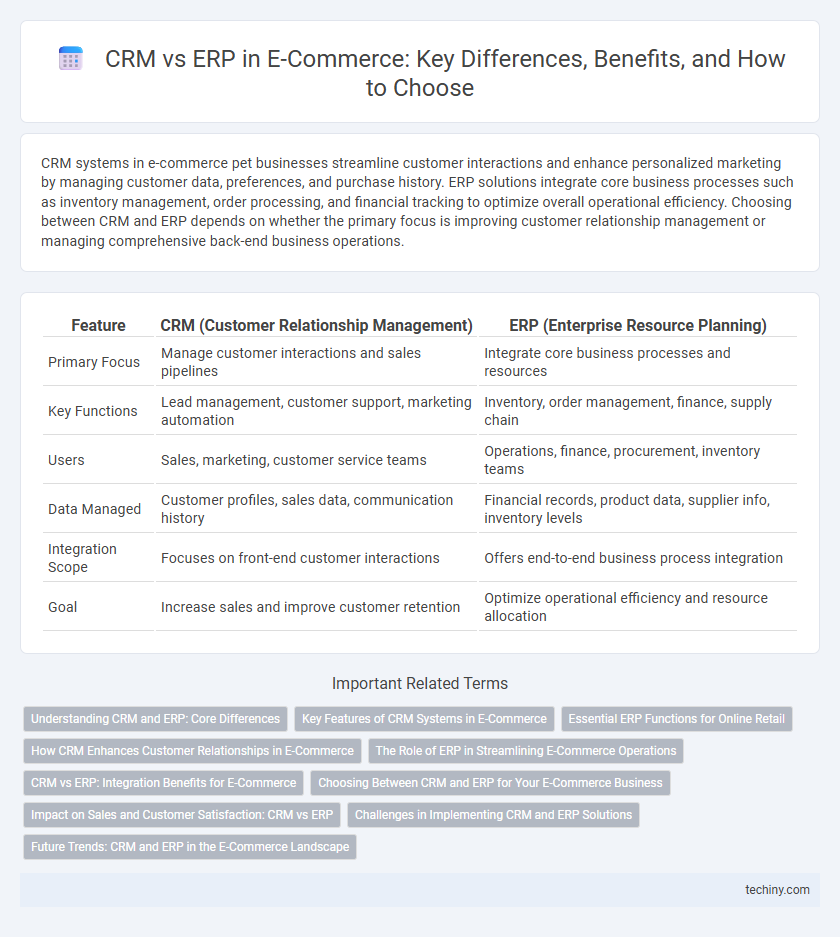CRM systems in e-commerce pet businesses streamline customer interactions and enhance personalized marketing by managing customer data, preferences, and purchase history. ERP solutions integrate core business processes such as inventory management, order processing, and financial tracking to optimize overall operational efficiency. Choosing between CRM and ERP depends on whether the primary focus is improving customer relationship management or managing comprehensive back-end business operations.
Table of Comparison
| Feature | CRM (Customer Relationship Management) | ERP (Enterprise Resource Planning) |
|---|---|---|
| Primary Focus | Manage customer interactions and sales pipelines | Integrate core business processes and resources |
| Key Functions | Lead management, customer support, marketing automation | Inventory, order management, finance, supply chain |
| Users | Sales, marketing, customer service teams | Operations, finance, procurement, inventory teams |
| Data Managed | Customer profiles, sales data, communication history | Financial records, product data, supplier info, inventory levels |
| Integration Scope | Focuses on front-end customer interactions | Offers end-to-end business process integration |
| Goal | Increase sales and improve customer retention | Optimize operational efficiency and resource allocation |
Understanding CRM and ERP: Core Differences
CRM (Customer Relationship Management) focuses on managing customer interactions, sales processes, and marketing campaigns to enhance customer satisfaction and retention in e-commerce. ERP (Enterprise Resource Planning) integrates core business functions such as inventory management, order processing, and financial accounting to streamline operational efficiency. Understanding these core differences helps e-commerce businesses optimize customer experience through CRM while improving backend processes and resource planning via ERP systems.
Key Features of CRM Systems in E-Commerce
CRM systems in e-commerce streamline customer data management, enabling personalized marketing and enhanced customer engagement through detailed purchase histories and behavior analytics. These platforms integrate multi-channel communication tools, automating sales and customer support to improve response times and customer satisfaction. Advanced CRM features also include segmentation, lead management, and targeted campaigns, driving higher conversion rates and fostering long-term customer loyalty.
Essential ERP Functions for Online Retail
Essential ERP functions for online retail include inventory management, order processing, and supply chain coordination, which streamline operations and reduce errors. Customer Relationship Management (CRM) focuses primarily on sales, marketing, and customer data insights, while ERP integrates finance, procurement, and logistics to support comprehensive business workflows. Leveraging ERP systems in e-commerce ensures real-time visibility into stock levels, financials, and supplier activities, optimizing overall efficiency.
How CRM Enhances Customer Relationships in E-Commerce
CRM enhances customer relationships in e-commerce by providing detailed customer data analytics and personalized marketing strategies that increase engagement and loyalty. Integration of CRM platforms with e-commerce systems allows real-time tracking of customer behavior and transaction history, enabling targeted promotions and improved customer support. This results in higher customer satisfaction, repeat purchases, and increased lifetime value for online retailers.
The Role of ERP in Streamlining E-Commerce Operations
ERP systems centralize inventory management, order processing, and supply chain operations, enabling e-commerce businesses to reduce errors and improve fulfillment speed. By integrating financial data with sales and procurement modules, ERP platforms provide real-time insights that enhance decision-making and cash flow management. This holistic operational oversight helps e-commerce companies scale efficiently while maintaining customer satisfaction and operational cost control.
CRM vs ERP: Integration Benefits for E-Commerce
CRM and ERP integration streamlines data flow between customer relationship management and enterprise resource planning systems, enhancing order accuracy and inventory management. This synergy enables e-commerce businesses to gain comprehensive customer insights, improve personalized marketing, and optimize supply chain operations. Efficient integration reduces manual data entry, minimizes errors, and accelerates response times, driving higher customer satisfaction and increased sales performance.
Choosing Between CRM and ERP for Your E-Commerce Business
Choosing between CRM and ERP for your e-commerce business depends on your operational priorities; CRM systems enhance customer relationship management by streamlining sales, marketing, and customer service, while ERP solutions integrate core business processes like inventory, order management, and accounting. E-commerce businesses focused on improving customer engagement and personalized marketing should prioritize CRM systems to boost customer retention and sales conversions. In contrast, companies requiring comprehensive oversight of supply chains and financials will benefit from ERP for seamless data integration and operational efficiency.
Impact on Sales and Customer Satisfaction: CRM vs ERP
CRM systems directly enhance sales and customer satisfaction by managing customer interactions, personalizing communication, and streamlining lead tracking, resulting in improved conversion rates and loyalty. ERP platforms support sales indirectly by integrating inventory, order management, and financial reporting, ensuring timely fulfillment and accurate data flow, which contributes to a smoother customer experience. Combining CRM and ERP solutions enables e-commerce businesses to optimize both front-end customer engagement and back-end operations, driving higher revenue and stronger customer relationships.
Challenges in Implementing CRM and ERP Solutions
Implementing CRM and ERP solutions in e-commerce faces challenges such as data integration complexities, customization requirements, and user adoption resistance. CRM systems must seamlessly manage customer data, marketing automation, and sales tracking, while ERP solutions need to handle inventory, order fulfillment, and financial management across multiple channels. Ensuring real-time data synchronization and scalability often requires significant technical expertise and change management strategies to maximize ROI.
Future Trends: CRM and ERP in the E-Commerce Landscape
Future trends in e-commerce highlight the increasing integration of CRM and ERP systems to streamline customer data management and operational processes. Advanced AI-driven analytics within CRM platforms enhance personalized marketing strategies, while ERP systems evolve to support real-time inventory and supply chain optimization. This convergence enables e-commerce businesses to deliver seamless customer experiences and agile, data-driven decision-making.
CRM vs ERP Infographic

 techiny.com
techiny.com